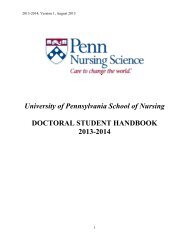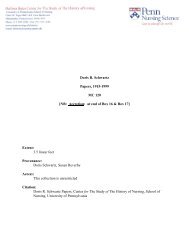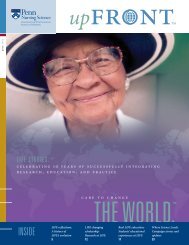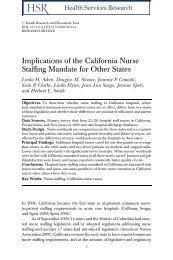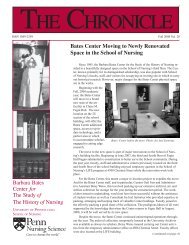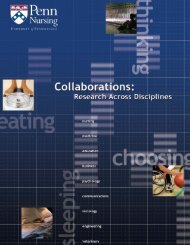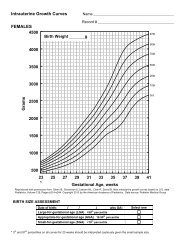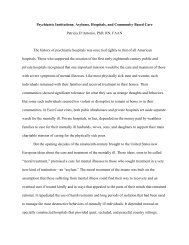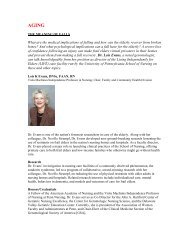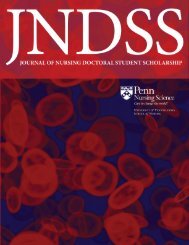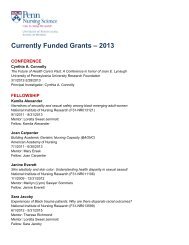Research Centers - University of Pennsylvania School of Nursing
Research Centers - University of Pennsylvania School of Nursing
Research Centers - University of Pennsylvania School of Nursing
Create successful ePaper yourself
Turn your PDF publications into a flip-book with our unique Google optimized e-Paper software.
Almost a million nurses. This shocking<br />
statistic is what many healthcare<br />
workforce experts estimate the U.S. nursing<br />
shortage will be by 2020. Because that<br />
number exceeds the total number <strong>of</strong> nurses<br />
in any other country in the world, it’s unlikely<br />
the U.S. can solve its nursing shortage<br />
through international recruitment. And many<br />
question whether it should.<br />
<strong>Nursing</strong> is one <strong>of</strong> the top five<br />
occupations in the U.S. projected to produce<br />
the most new jobs as more than half a<br />
million nurses retire within the decade and<br />
the population ages and nursing school<br />
graduates fall short. The consequences <strong>of</strong> a<br />
significant nurse shortage include problems<br />
<strong>of</strong> healthcare access and quality, impaired<br />
emergency response, consequences to the<br />
military, and even slowed economic growth.<br />
“The mission <strong>of</strong> the Center for<br />
Health Outcomes and Policy <strong>Research</strong><br />
(CHOPR) is to develop the science <strong>of</strong> how<br />
nursing contributes to achieving good<br />
patient outcomes and the evidence base<br />
for managing the nurse workforce to meet<br />
national and global healthcare needs,”<br />
says Center Director Linda Aiken, HOM<br />
’88, PhD, RN, FAAN, FRCN, the Claire M.<br />
Fagin Leadership Pr<strong>of</strong>essor in <strong>Nursing</strong> and<br />
Pr<strong>of</strong>essor <strong>of</strong> Sociology. “We apply scientific<br />
findings to improve evidence-based<br />
decision-making in practice and policy.”<br />
Established in 1989, CHOPR consists<br />
<strong>of</strong> an interdisciplinary team involving 30<br />
faculty, staff, research fellows, and students<br />
from nursing, medicine, sociology, and<br />
economics who conduct large-scale National<br />
Institutes <strong>of</strong> Health (NIH) studies. As a result<br />
<strong>of</strong> the Center’s innovative work, it has been<br />
designated a National Institute <strong>of</strong> <strong>Nursing</strong><br />
<strong>Research</strong> (NINR) P30 research core center.<br />
CHOPR’s original research agenda,<br />
begun in 1988, considered whether there<br />
were exemplary hospitals for nursing<br />
practice, whether patient outcomes were<br />
better in such hospitals, and whether<br />
these hospital environments could be<br />
replicated. This area <strong>of</strong> inquiry produced<br />
an evidence base <strong>of</strong> superior outcomes<br />
for these hospitals which eventually led<br />
to the Magnet Recognition Program <strong>of</strong> the<br />
American Nurses Credentialing Center. “We<br />
demonstrated that magnet hospitals have<br />
lower Medicare mortality rates than matched<br />
non-magnet hospitals,” says Dr. Aiken. “We<br />
determined from surveys <strong>of</strong> nurses practicing<br />
in magnet hospitals that their institutions had<br />
organizational attributes that were different<br />
from other hospitals. In subsequent research,<br />
we have demonstrated that hospitals in the<br />
Cultivating<br />
the Next Generation <strong>of</strong><br />
Scientists<br />
CHOPR <strong>of</strong>fers Advanced Training<br />
in <strong>Nursing</strong> Outcomes <strong>Research</strong> via<br />
a (T32) NINR, NIH grant that<br />
provides funding for pre-doctoral<br />
and postdoctoral research fellows.<br />
Ann Kutney Lee, a doctoral student<br />
whose research interests include<br />
nurse organization, quality <strong>of</strong> care,<br />
and patient outcomes, especially<br />
in those with mental illness, will<br />
continue her work at CHOPR as a<br />
postdoctoral fellow. “This decision<br />
was made with firsthand knowledge<br />
that CHOPR has the power, ability<br />
and resources to make change<br />
happen in healthcare,” she says.<br />
Dr. Aiken (far right) with the Armenian nurses that were trained as part <strong>of</strong> the<br />
<strong>Nursing</strong> Quality Improvement Program.<br />
Postdoctoral fellow Eunhee Cho,<br />
GR ’05, GNu ’06, PhD, MPH, MSN,<br />
RN, is the project director for the<br />
<strong>School</strong> <strong>of</strong> <strong>Nursing</strong>’s Global <strong>Research</strong><br />
Collaborative Initiative. “This initiative<br />
aims to create a research partnership<br />
between Penn <strong>Nursing</strong>, the Yonsei<br />
<strong>University</strong> <strong>School</strong> <strong>of</strong> <strong>Nursing</strong> in<br />
South Korea, and Penn <strong>Nursing</strong>’s<br />
South Korean alumni to replicate<br />
CHOPR’s International Hospital<br />
Outcomes Study examining the impact<br />
<strong>of</strong> differential staffing levels and<br />
organizational attributes on patient<br />
and nurse outcomes in South Korea.”<br />
september 2007 | 9





